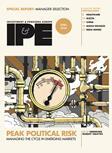The £9bn (€10.1bn) Merseyside Pension Fund has invested £400m in a new worldwide equity climate fund, run by State Street Global Advisors.
The All World Equity Climate Balanced Multi-Factor Index fund was designed to align Merseyside’s responsible investment policy and activities with the goals of the 2015 Paris climate accord, the pension fund said.
As part of this, the fund had considered the options for capturing both the risks and opportunities arising from climate change, it added.
The new fund tracked the FTSE All-World Climate Balanced Comprehensive Factor index, designed by FTSE Russell.
Last year, Merseyside – the fifth largest in the Local Government Pension Scheme (LGPS) system in the UK – announced that it had selected a smart sustainability index from FTSE Russell, to support its climate risk strategy within the fund’s listed equity portfolio.
The pension fund said that the index provided broad exposure to the target equity universe, and was constructed using Russell’s “innovative and transparent” multi-factor weighting methodology. This approach would increase exposure to low volatility, momentum, quality, size and value factors, it said.

The parameters for climate change considerations would be carbon efficiency, fossil fuel reserves and the green revenues of investments, assessed using FTSE Russell’s green revenues data model.
Owen Thorne, investment manager at Merseyside, said that the new fund would provide “an investable, risk-efficient means of achieving the scheme’s goals for decarbonisation”.
Aled Jones, head of sustainable investing Europe for FTSE Russell added that the index provided “a transparent means of integrating climate considerations into a passive equity portfolio and also aligned with investor stewardship objectives”.
Peter Wallach, Merseyside’s director of pensions, told IPE that the scheme expected returns at least in line with a market-cap-weighted index from the new fund, adding that it would also be open to investment by other institutional players.
Although no pension funds had shown a concrete interest yet, Merseyside was discussing the issue with at least two other schemes, he said. The scheme has formed an asset pooling partnership with the Greater Manchester Pension Fund and the West Yorkshire Pension Fund, known as Northern LGPS.
Wallach added that further investments in the new fund by Merseyside would depend on the outcome of a wide-ranging review of the scheme’s investment strategy.
The £400m represented one-third of the scheme’s investments in passive equity strategies, according to Wallach.
People’s Pension adds ESG multi-factor fund to default option
MPF’s move comes after The People’s Pension, a £5bn multi-employer defined contribution scheme, in December began investing in a new multi-factor fund that aims to reduce exposure to fossil fuels.
Over the next 12 months it expects to invest £1bn in the smart beta equity index fund, which it developed with State Street Global Advisors and MSCI.
The State Street ACS Multi-Factor Global ESG Equity Index fund forms part of the master trust’s default option, so the vast majority of its 4m members will have savings allocated to it.

Nico Aspinall, chief investment officer of the master trust, said the motivation for investing in the fund was to improve risk-adjusted returns for its members.
“We think this fund offers the same – if not better – returns at lower risk compared with market-cap-weighted approaches,” he told IPE.
“The fundamental question is: are we going to be emitting more or less carbon dioxide? This is a portfolio that is on the other side of that.”
The fund targets five established equity factors – value, quality, low volatility, momentum and size – and a reduction in carbon emissions and reserves intensity. The worst 20% of companies are also excluded on the basis of MSCI’s environmental, social and corporate governance (ESG) scores.
Guido Giese, executive director of MSCI, said: “Institutional investors are increasingly seeking to incorporate ESG considerations into factors. This index aims to incorporate ESG-based and carbon-based constraints in a bottom-up index construction approach.”













No comments yet